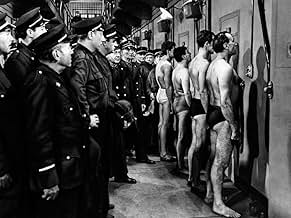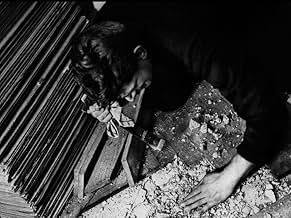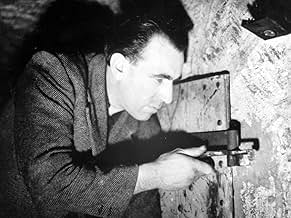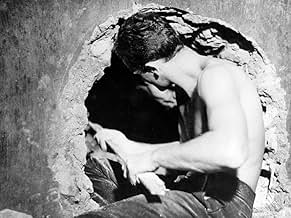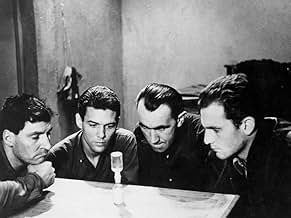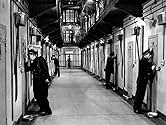IMDb-BEWERTUNG
8,5/10
22.110
IHRE BEWERTUNG
Vier Häftlinge mit langjährigen Haftstrafen haben einen ausgeklügelten Ausbruchsplan, in den sie einen neuen Insassen einweihen, damit er sich ihrem Vorhaben anschließt. Misstrauen und Ungew... Alles lesenVier Häftlinge mit langjährigen Haftstrafen haben einen ausgeklügelten Ausbruchsplan, in den sie einen neuen Insassen einweihen, damit er sich ihrem Vorhaben anschließt. Misstrauen und Ungewissheit sind die Folge.Vier Häftlinge mit langjährigen Haftstrafen haben einen ausgeklügelten Ausbruchsplan, in den sie einen neuen Insassen einweihen, damit er sich ihrem Vorhaben anschließt. Misstrauen und Ungewissheit sind die Folge.
- Nominiert für 2 BAFTA Awards
- 2 Gewinne & 4 Nominierungen insgesamt
Marc Michel
- Claude Gaspard
- (as Mark Michel)
Jean-Paul Coquelin
- Le lieutenant Grinval
- (as J. Paul Coquelin)
Albert Augier
- Un gardien
- (Nicht genannt)
Jean Becker
- Un gardien
- (Nicht genannt)
Mick Besson
- Deuxième plombier
- (Nicht genannt)
Georges Bielec
- Figurant
- (Nicht genannt)
Raymond Bour
- Un gardien
- (Nicht genannt)
Philippe Dumat
- Un gardien
- (Nicht genannt)
Gérard Hernandez
- Le détenu à l'infirmerie
- (Nicht genannt)
Jean Luisi
- Un détenu
- (Nicht genannt)
Empfohlene Bewertungen
Before his life was cut short prematurely, Director Jacques Becker created his very personal film, "Le Trou" ("The Hole"). Using mostly then nonprofessional actors, M. Becker elicited extremely naturalistic and powerful performances in a reportedly true-life prison-escape drama set in France.
It was especially interesting to see Marc Michel in his film debut. Made four years before Michel scored a hit as Roland in "Les Parapluies de Cherbourg," Michel here subtely creates a fascinating character. His work is seemingly effortless, yet always intriguing. He stands at the center of a group of convicts planning a daring escape--a group which has difficulty in fully trusting his loyalty.
The routine of prison life as well as the actual escape is done with such detail that the viewer feels part of the action. The black-and-white photography enhances the realism of the presentation, done without a musical background.
Generally a "forgotten film," "Le Trou" is a carefully constructed prison drama, most convincingly executed. It is a credit to both a hard working cast and director.
It was especially interesting to see Marc Michel in his film debut. Made four years before Michel scored a hit as Roland in "Les Parapluies de Cherbourg," Michel here subtely creates a fascinating character. His work is seemingly effortless, yet always intriguing. He stands at the center of a group of convicts planning a daring escape--a group which has difficulty in fully trusting his loyalty.
The routine of prison life as well as the actual escape is done with such detail that the viewer feels part of the action. The black-and-white photography enhances the realism of the presentation, done without a musical background.
Generally a "forgotten film," "Le Trou" is a carefully constructed prison drama, most convincingly executed. It is a credit to both a hard working cast and director.
I watched this masterpiece first time before 10 years and I was stunned. Now, I watched it before few days again and I am really surprised how this remarkable movie functions and become better and better. It is really ingenious portrait of human interaction and cooperation, great "prison-escape" drama that bring us unique way of telling story (in long shots) looking so realistic and powerful.
One of the best movies I've ever seen!
10/10
One of the best movies I've ever seen!
10/10
Jacques Becker's "Le Trou" is one of the greatest of all prison-break films. No film lover should miss it. It is every bit as masterful and tense as other milestones of this subgenre, including John Sturges' "The Great Escape," Robert Bresson's masterpiece "A Man Escaped," and Don Siegel's "Escape from Alcatraz." The meticulous preparation for the escape is a nail-biter, with many adrenaline-inducing close calls. The ringer: Will the newly exonerated prisoner stay with the group and escape or rat on the others? Those seeking pure entertainment or those seeking existentialist philosophical fare will be equally pleased. A memorable movie experience.
Jacques Becker's swan song is a real gem of a film. Le Trou has such an amazing kinetic rhythm to it that one both feels and forgets the claustrophobic environs. Based on a real story turned into a novel by one of the "escapees", the film has excellent casting, wonderful (candel-lit!) cinematography and crisp dialog among its other advantages.
The director was terminally ill during the shoot and was to die after making the final cut. Watching this classic now some four decades since auteur's death, one can only wonder what an artist it would take to demand and achieve such breathtaking perfection in art while combating death at the same time.
Do not let yourself be put off by "yet another prison-movie!" talk. It is too good to be just that. So much so that it could merit comparison with Bresson's "A Man Escaped". A very deserving 10 out of 10.
The director was terminally ill during the shoot and was to die after making the final cut. Watching this classic now some four decades since auteur's death, one can only wonder what an artist it would take to demand and achieve such breathtaking perfection in art while combating death at the same time.
Do not let yourself be put off by "yet another prison-movie!" talk. It is too good to be just that. So much so that it could merit comparison with Bresson's "A Man Escaped". A very deserving 10 out of 10.
This most powerful of escape stories is a wonderful exposition of the most basic human qualities, ingenuity and cooperation, and the innate drive toward freedom that brings these qualities into being.
While the theme of transcendence is certainly present (although not be-labored) as in A MAN ESCAPED, it is interesting that, in direct contrast to Bresson's work, transcendence is here achieved through work WITH others on a task. The inmates form a unique brotherhood through their joint reliance. This allows them to be IN the prison while not OF it and is quietly visible from the early moments of the film. We see this group bond deepened through each risk taken, each chisel blow against a concrete wall, and we become emotionally tied to the characters' quest simply through observing their effort (it is amazing how dramatic hammering away at a concrete wall can be). No verbal exposition is necessary, no creation of characters and their pasts intrudes to distract us from their task, which IS the drama.
Indeed Becker's film is as notable for what is left out as for what is included. There are no prison "types" created, his style is restrained to the point of being transparent, not to the point of calling attention to itself as "bare" or "ascetic" as Bresson's is. We get no exposition of the horrors of prison life; just enough detailing of the regimentation, drabness of environment, and lack of personal space to make us aware of the institution's suffocating presence. There are no sudden surprises or plot shifts. Well, maybe one. The shot in the mirror near the end of the film is so surprising that I literally couldn't take it in for a few seconds, I thought it had to be a dream: that's how involved with the characters I was! Finally, there is no use of music to pump up the suspense. There IS, however, a powerful and unique use of sound. We hear, in an almost hallucinatory fashion, every thump, clang, and wail within the prison walls and, during the digging scenes, Becker apparently uses a dual soundtrack combining naturalistic sound with heightened effects of the digger's grunts, heavy breathing, and THUMPS of metal against rock. Again this serves to effectively involve us with physical/emotional effort of their task. The cacophony the end of the film harshly accents our sense of disturbance and loss.
It is also worth noting that the apparent "innocent" in the film is the only one who does not achieve transcendence. While he may legitimately gain his freedom, he remains locked within the bounds of his own ego ("poor Pierre" says the leader of the break). Another interesting contrast (reply?) to Bresson.
Altogether a powerful statement that humans at work can be intrinsically dramatic subject matter, that the most simple of subjects can be the most visually entrancing (and emotionally resonant) and a grand illustration of the maxim that "God (and/or art) is in the details". 10/10
While the theme of transcendence is certainly present (although not be-labored) as in A MAN ESCAPED, it is interesting that, in direct contrast to Bresson's work, transcendence is here achieved through work WITH others on a task. The inmates form a unique brotherhood through their joint reliance. This allows them to be IN the prison while not OF it and is quietly visible from the early moments of the film. We see this group bond deepened through each risk taken, each chisel blow against a concrete wall, and we become emotionally tied to the characters' quest simply through observing their effort (it is amazing how dramatic hammering away at a concrete wall can be). No verbal exposition is necessary, no creation of characters and their pasts intrudes to distract us from their task, which IS the drama.
Indeed Becker's film is as notable for what is left out as for what is included. There are no prison "types" created, his style is restrained to the point of being transparent, not to the point of calling attention to itself as "bare" or "ascetic" as Bresson's is. We get no exposition of the horrors of prison life; just enough detailing of the regimentation, drabness of environment, and lack of personal space to make us aware of the institution's suffocating presence. There are no sudden surprises or plot shifts. Well, maybe one. The shot in the mirror near the end of the film is so surprising that I literally couldn't take it in for a few seconds, I thought it had to be a dream: that's how involved with the characters I was! Finally, there is no use of music to pump up the suspense. There IS, however, a powerful and unique use of sound. We hear, in an almost hallucinatory fashion, every thump, clang, and wail within the prison walls and, during the digging scenes, Becker apparently uses a dual soundtrack combining naturalistic sound with heightened effects of the digger's grunts, heavy breathing, and THUMPS of metal against rock. Again this serves to effectively involve us with physical/emotional effort of their task. The cacophony the end of the film harshly accents our sense of disturbance and loss.
It is also worth noting that the apparent "innocent" in the film is the only one who does not achieve transcendence. While he may legitimately gain his freedom, he remains locked within the bounds of his own ego ("poor Pierre" says the leader of the break). Another interesting contrast (reply?) to Bresson.
Altogether a powerful statement that humans at work can be intrinsically dramatic subject matter, that the most simple of subjects can be the most visually entrancing (and emotionally resonant) and a grand illustration of the maxim that "God (and/or art) is in the details". 10/10
Wusstest du schon
- WissenswertesThe scene where three different characters take turns breaking through the concrete floor of their cell is filmed in a single, nearly four minute long, shot.
- PatzerWhen Geo checks the corridor with the mirror and takes a break to say goodbye to his cellmates, he leaves the mirror in the hole. However, when he goes back to checking the corridor he has to stick the mirror back into the hole first.
- Zitate
[last lines]
Roland Darban: [stripped, facing the wall under guard] Poor Gaspard.
- VerbindungenFeatured in Mon père, il m'a sauvé la vie (2001)
Top-Auswahl
Melde dich zum Bewerten an und greife auf die Watchlist für personalisierte Empfehlungen zu.
- How long is The Hole?Powered by Alexa
Details
Box Office
- Bruttoertrag in den USA und Kanada
- 34.588 $
- Eröffnungswochenende in den USA und in Kanada
- 6.756 $
- 2. Juli 2017
- Weltweiter Bruttoertrag
- 34.588 $
- Laufzeit2 Stunden 11 Minuten
- Farbe
- Seitenverhältnis
- 1.66 : 1
Zu dieser Seite beitragen
Bearbeitung vorschlagen oder fehlenden Inhalt hinzufügen




